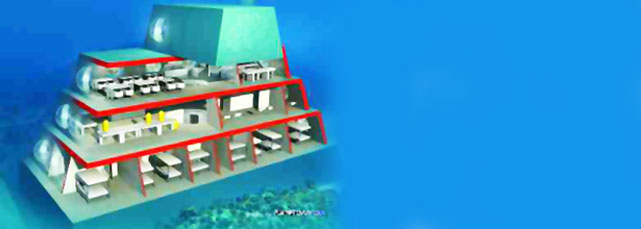EMC News – A Kingston man is behind the push to build an extraordinary new ocean-floor research facility – one researchers hope will help preserve aquatic life for generations to come.
Kenn Feigelman is the “token Canadian” aboard a team of researchers who hope to build Sea Base 1 Habitat, a facility off Belize that would monitor the health of coral reefs.
“It’s basically like the space station, but instead of outer space it’s in inner space,” said Feigelman, who owns Deep/Quest 2 Expeditions, an underwater filmmaking and research business. The plan is to create an underwater habitat where divers can live for days on end and conduct research. It’s important to study coral reefs, he said, because they’re considered similar to “the canary in the coal mine.”
Miners once put canaries in mines to test oxygen levels. If the canary died, it was a sign of trouble to come. Similarly, the health of a coral reefs are indicative of what’s to come, Feigelman explained.
“The way the coral reefs go is the way the ocean is going,” he said. “They represent less than two-tenths of one per cent of the ocean floor, but their importance is second to none. They serve as a nursery and a life station for the ocean’s life. When you damage coral reefs you’re damaging nursery for fish stock in the future because most breed there.”
Feigelman said the team likely needs to raise more than $25 million to have the project up and running by 2013, as planned. However, he believes it’s a realistic goal, because research companies, universities and even-tourists stand to gain from the project.
The proposal calls for a roughly 30 by 60 foot, multi-layered facility to be built on a sand floor, roughly 60 feet below the surface. A transfer tube would connect the building to surface level.
Feigelman said the facility will have glass windows for the scientists to observe the ocean floor over long periods of time. He said the plan is to allow tourists to enter the facility, too, providing they’re qualified divers. Such a facility, Feigelman said, will allow for more accurate research to be conducted in safer conditions. Traditionally, marine scientists do research by performing “bounce dives,” which means, jumping into the water, collecting samples, and coming right back up.
“Here it’s much safer, there’s no chance of coming into decompression issues,” he said. “The researchers can take samples back into the dry lab or wet lab, they can make their notes, and they can then send them up the surface in the transfer tube, they’re not a whim of Mother Nature, they’re protected from storms and hurricanes.”
Feigelman, a veteran diver known for his underwater filming resume – which includes documenting shipwrecks in Ontario and New York – became involved in the project after attending a divers’ conference in New Jersey.’
There, he met Dr. Richard Cooper, a retired marine scientist from the University of Connecticut, who was starting to promote Sea Base 1 Habitat. Cooper eventually asked Feigelman to join his team. Feigelman is now in charge of promoting the project to interested groups.
He is using the acronym REEF to promote the project, saying that Sea Base 1 Habitat will be a “Research, Education and Eco-tourism Facility.” Over time, he also intends to be a consulting scientific partner with the facility. He hopes to be one of the first to live in the facility for a time period when it’s up and running. “I’m very proud to be on board,” he said. “To be the only Canadian on board is quite cool.”













